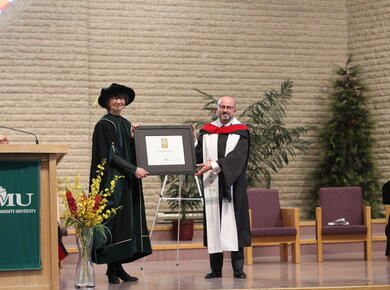Posted: September 19, 2023
César García, general secretary of Mennonite World Conference, received the PAX Award from Canadian Mennonite University (CMU) on 28 April 2023.
The PAX award honours people who lead exemplary lives of service, leadership and reconciliation in society. “CMU is inspired by César García and Mennonite World Conference as a whole in nurturing a global communion of churches,” says CMU president Cheryl Pauls. “The MWC Shared Convictions are formative for CMU as a learning community that is rooted in the Anabaptist faith tradition.”
The article below has been adapted from the address he gave.
How can we know when is the right time to do something? How can we know what to do when we face a challenging context?
The author of Ecclesiastes wrote:
a time to seek and a time to lose;
a time to keep and a time to throw away;
a time to keep silent and a time to speak;
a time for war and a time for peace
That book was likely written during the timeframe narrated in the book of Nehemiah. After decades of suffering under the oppression of the Assyrian and Babylonian Empires, people from Judah could finally return to their land in Palestine. Oppression was not entirely over, but at least the option of rebuilding the Temple and walls of Jerusalem was there.
In this narrative, Nehemiah teaches how to discern the times and how to respond.
First, Nehemiah was a listening agent.
He was sensitive to what others were dealing with and suffering.
Nehemiah could have ignored the challenges of others. After all, he was a stranger in a foreign land, an enslaved person in exile. His circumstances were bad enough to focus on himself.
But he did not. He listened. He saw a need.
In times of difficult circumstances, we need people that hear. Listening is intensely therapeutic in counselling. Often the greatest gift we can give someone is to listen to them.
That is why MWC makes decisions by consensus. Of course, it is easier to make decisions democratically by a simple majority. However, listening to each other is more important than getting winners and losers in a decision.
Second, Nehemiah was an agent of responsibility
While living far from his home with limited freedom, Nehemiah could have blamed the former leaders of Israel, his forebears and the colonial empires of his time for his unfortunate destiny.
But he did not. He saw the situation, assumed responsibility and acted to transform it.
That attitude is in deep contrast with the sense of victimhood everywhere. It wasn’t us. It was the government. Or the banks. Or our family. It is the fault of the others, the ones not like us, infidels, sons of Satan.
Amid disasters, MWC has chosen responsibility by bringing multiple parties to respond in a coordinated way to the challenges of our times.
As I speak today our churches in Myanmar are giving rice to thousands of refugees, some of them members of our churches who have lost everything because of the civil war in that country. That is possible because people like you and me have been praying for them and sending financial support to help these churches.
Third, Nehemiah was an agent of hope.
Even in the darkest moments, Nehemiah could see through the clouds of disaster to the clear sky beyond.
However, he was not just an optimist. Optimism is the belief that things will get better. Hope is the belief that if we work hard together, we can improve things.
Optimism is a positive attitude. Christian hope is seeing the future according to God’s vision and acting, depending on the Holy Spirit. Remember, Nehemiah prayed and fasted after listening.
MWC is an agent of hope by bringing together churches and working on unity and reconciliation through our faith in Christ in a world immersed in conflict fragmentation and divisions.
Fourth, Nehemiah was an agent of a new reality.
In times of crisis, Nehemiah defined the state of things, specified his goals and showed the map to others.
Greek philosopher Epictetus said: “It’s not what happens to you, but how you react to it that matters.”
There are many possible reactions to times of crisis. For some, challenging times are a time to close their eyes. For others, it is a time to wait for somebody else to do something. In times of crisis, some people complain or criticize.
MWC is an agent of a new reality by living out unity amid global diversity. MWC is us. It is people like you and me who think it is possible to be a worldwide community of faith where theological and cultural differences are respected and celebrated, where divisions, polarization and fragmentation do not have to be the only possible reality.
These are challenging times in the church, our societies, and the world. Some of us may be facing personal crises or unexpected needs. Yet, this time is not a time to quit.
God invites us to act, to be part of the solution. God does not do it for us; God works through us!
Therefore, this time is a time to listen, take responsibility, be agents of hope and build a new reality.
This is one of MWC’s Shared Convictions and is a core aspect of our call to work shoulder-to-shoulder with sisters and brothers around the world and to learn from their courageous testimony.
Join us in building peace worldwide with the Anabaptist-Mennonite family. Your most generous gift today enables MWC to extend the reach of peace and justice initiatives among our 108 member churches in nearly 60 countries.




Join the Conversation on Social Media
FacebookTwitterInstagramFlickrYouTube